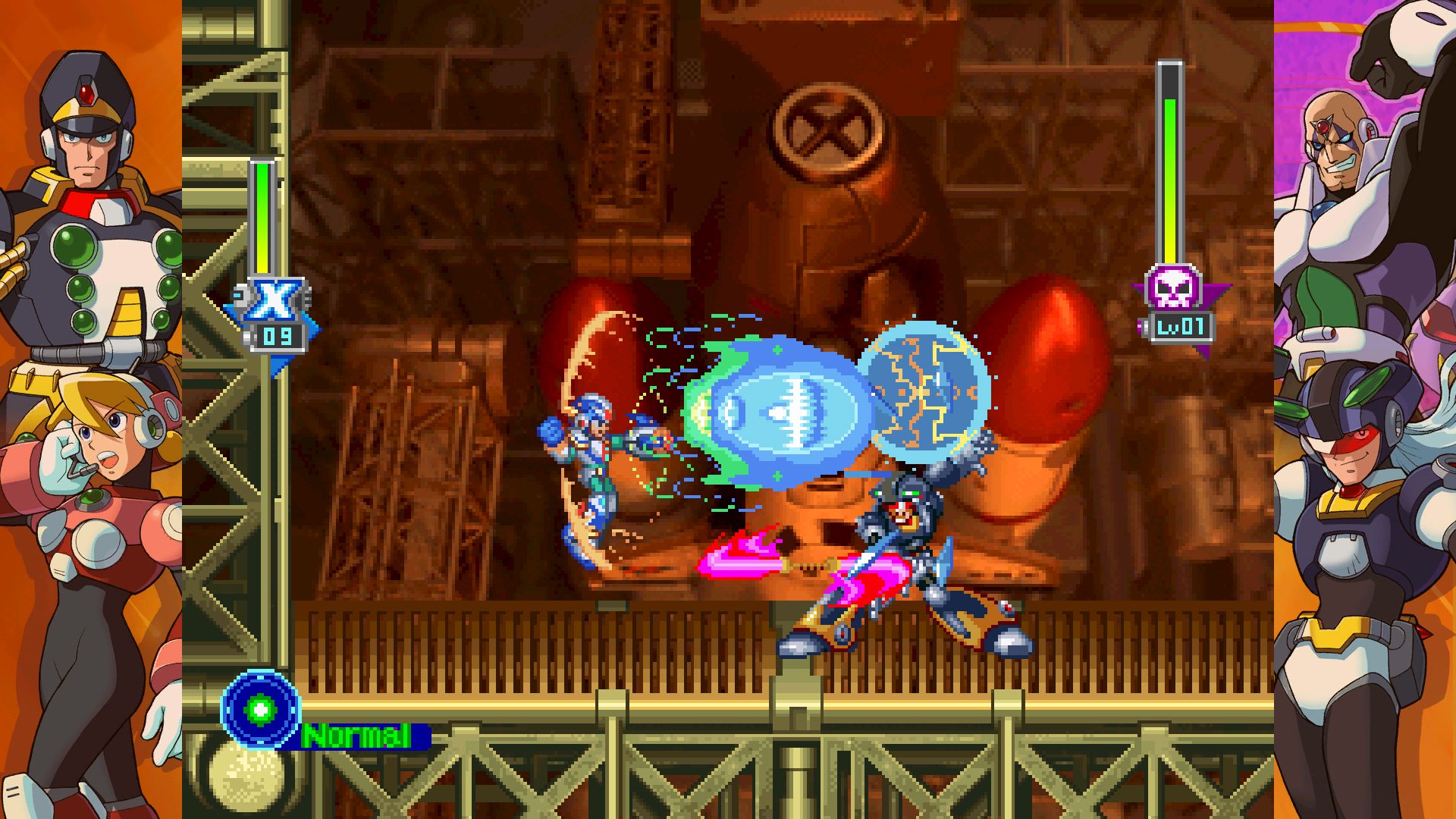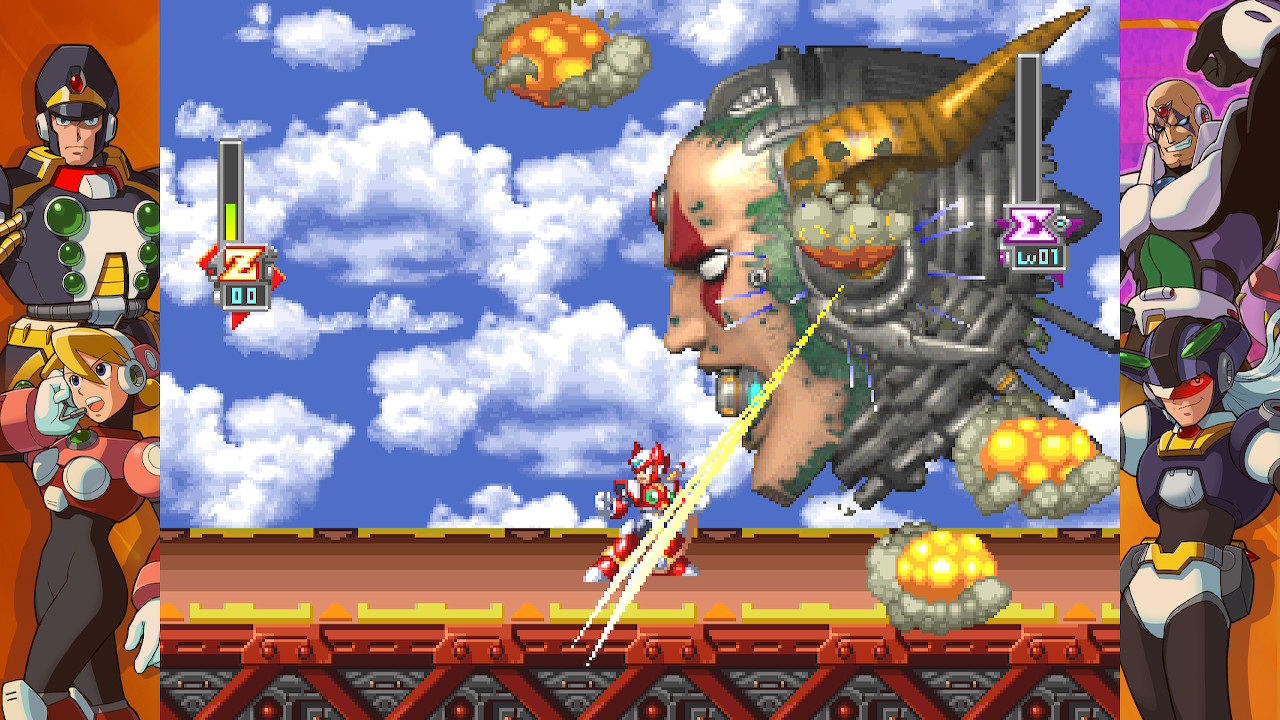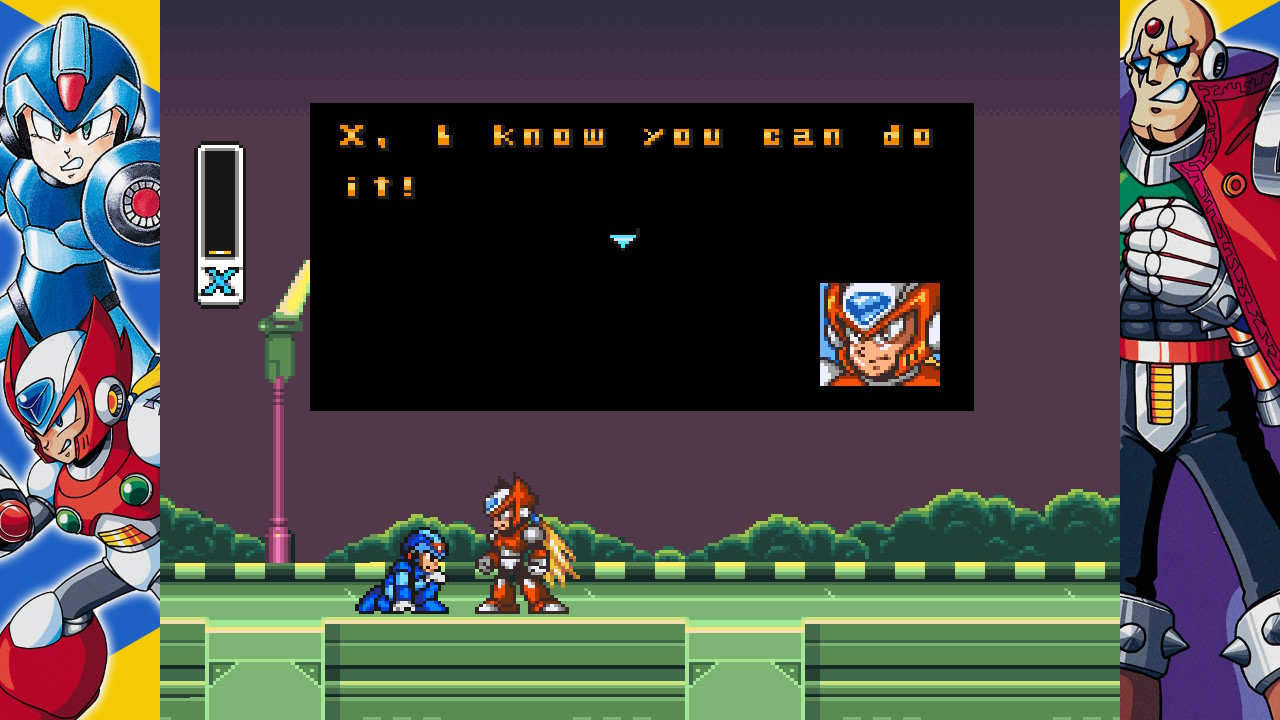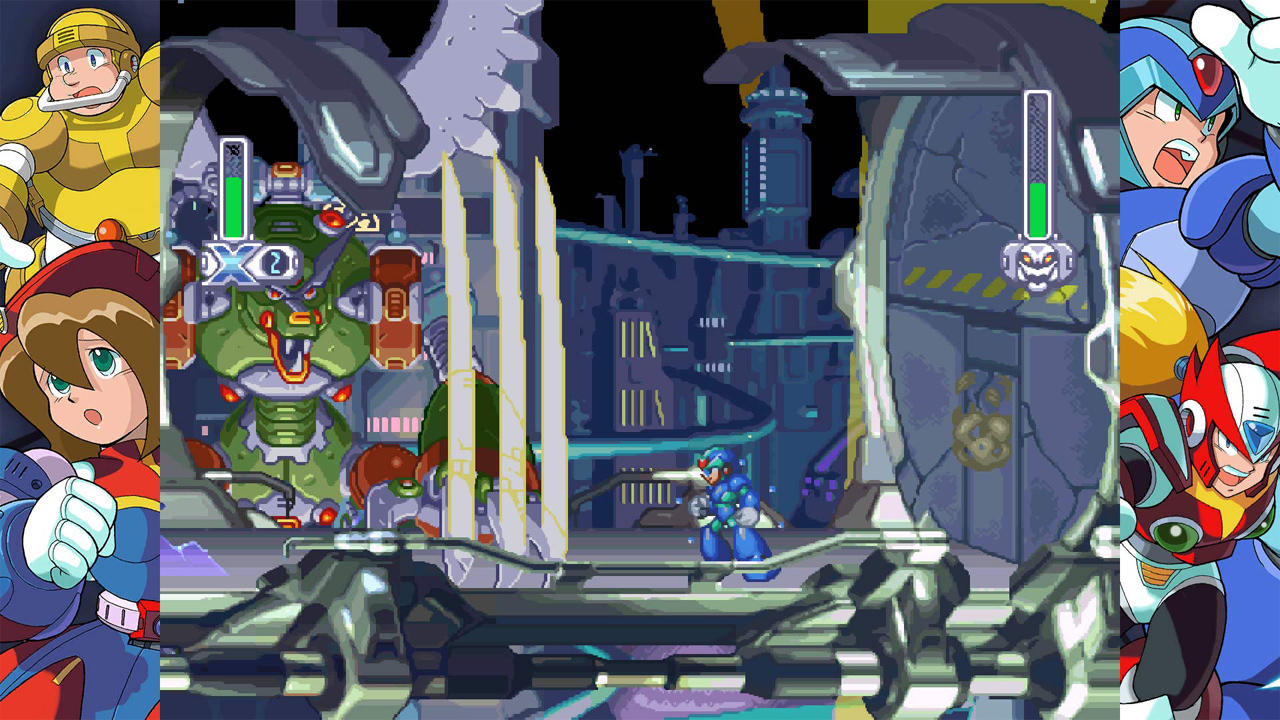It is no secret that I am a massive Mega Man fan. If you follow me on Twitter, you’ve probably seen my small collection of figurines and statues dedicated to the series. Beyond just reliving some cherished childhood memories, this was a chance for me to go back and finally complete every last mainline Mega Man game. I had heard that several of the later X games were almost universally panned and were just very poor games, tarnishing the overall excellence of the series. I will say that this is both accurate and inaccurate – let’s find out in my review!
Mega Man Legacy X Collection 1 + 2
Publisher: Capcom
Developer: Capcom
Platform: Windows PC, Nintendo Switch (Reviewed), PS4, Xbox One
Release Date: July 24th, 2018
Players: 1 Player
Price: $39.99
The Mega Man X games are a natural continuation of the Mega Man franchise. The X series were designed as a new entry and progression of the series, which debuted on the NES. All of the traditional elements and mechanics found in the original series make their way to the new series.
Beyond that, the X series begin offering up a plethora of new mechanics, abilities and gameplay options to challenge veteran players and bring newer players in to the fold.
One of the biggest differences between the X series and the original series is that the X series is a much more story driven endeavor, with each game building upon the lore and history of the one before it.
This is both a blessing and a curse for the series, but overall it adds something that the series desperately needed, but it could have been slightly better, especially with the later entries to this series. There really is a lot to love and enjoy in the new series of this classic franchise.
I will add this one disclaimer before I fully delve in to the review of this collection: Like my Mega Man Legacy review, there are just too many games here to give each and every one of them their own time in the sun.
I will be viewing this collection as one complete game, reviewing it as a whole, rather than a sum of its parts. The final score will be as one whole collection, rather than focusing on individual games or breaking the collection into volume 1 & 2.
The Mega Man X franchise picks up where the original series left off in terms of overall gameplay. X, Zero and (later on) Axl, still primarily go through 8 Robot Master stages, now called “Mavericks” with a series of stages that test the skills gained through the main game.
Now, however, instead of taking on Wily at the end of the game, players are now faced with the new villain of the series, Sigma. Many of the same mechanics found in the original series make a come back with the X series.
There is plenty of platforming goodness to test and challenge new and returning players. You will still collect extra lives, energy and life capsules and, like in the last few Mega Man games, you will be able to collect tanks that will instantly refill your life or energy when you use them.
Beyond just “running and gunning” that was so iconic in the original series, X, the main protagonist of the new series, sees a major upgrade in the abilities that he can use and gain throughout all 8 titles of the new series.
Each and every game in the X series allows X to wall jump and dash, not something seen in the original NES, SNES and PSX games of the original. X, in an evolution of the Rush armors found in the original games, can now find “Light Capsules” strewn across each of the main Maverick boss stages.
These capsules offer him up several new armors that he can use to increase his arsenal of attacks. In the later games, more than one armor set can be found and in at least one of the later games, these armor sets are almost required to complete the main game.
As you find these armor sets, X will have the ability to charge up the main Maverick weapons obtained from various bosses, adding more fire power and options. Some armors will allow you to walk on spikes and not be instantly killed. Some will allow X to hover, glide, double jump, and even fly.
Starting with Mega Man X3 and continuing on with each subsequent game in the series, players will have that option of playing as a secondary protagonist, Zero. Later games make a small change to this formula and will eventually add in a third protagonist, Axl.
This adds whole new ways to play through each game where it is offered and changes the story depending on who you either choose to play the game as or who you defeat the final boss as. Generally speaking, Zero and X play very different from each other.
Zero is slightly stronger than X, but is also a very close quarters type of character, mostly relying on his Z-saber to defeat enemies and bosses. Whereas X will receive a new special weapon when he defeats a Maverick boss, Zero will either gain a new attack or a new special ability.
These include double jumping, air dashing, or an increase to his overall damage. Zero will eventually be able to gain a different costume if the player hunts it down, and like X, this alternate costume will eventually become an unlock in later games.
Axl, in the 2 games that he appears in, will at first play very similarly to X. However, in X8 he gains his own personality in terms of gameplay and will also receive an unlockable costume that will augment his combat abilities.
For the most part, many of the changes to gameplay mechanics are very good and are a welcome addition to the Mega Man franchise. These blend in seamlessly with the overall gameplay, at least, when speaking of Mega Man X 1 through 4.
Unfortunately, whereas the original series kept with the same basic mechanics all throughout the 10 entries in that series, the X franchise decided midway through that even more changes had to be made in order to keep the series fresh.
These changes generally coincide with what many fans view as a decrease in overall quality of the franchise. Starting with X5, players will have to rescue reploids in each stage.
Each rescued reploid will either refill the life meter, grant an extra life, or in some cases, increase the played characters life meter or give the ability to create a new ability for the main playable characters.
Unfortunately, this adds in a bit of randomness to the series and also creates an artificial difficulty spike, as some reploids are extremely difficult to find and/or save. If the player is unable to save them, you will permanently lose out on the increase or ability they would have offered the player.
Luckily, X8 breaks this mold, replacing the need to rescue reploids with the player needing to find “rare metals” hidden throughout the stages to create new abilities for the trio.
Personally speaking, X 1-4 and X8 are perhaps the best in the series with X5 being both very good and also the point in the series where you can see the start of the decrease in terms of quality. X6 was “okay” but was obviously rushed and had several moments of questionable gameplay.
One of the very first Sigma stages almost fully requires the use of one of the hidden armor sets for X in order to be completed, something no other game in the series required. X7 on the other hand, is just terrible.
X7 is the first, and last time, the series attempted a 3D gameplay model and it just didn’t work out. The game is sluggish and many of the 3D sections of the game just don’t work out as intended. Beyond that, X is very out of character and won’t be playable through the first half of the game.
X6 and X7 alone drop the overall quality of the collection and cause MMXLC2 to be the worse of the 2 volumes offered in the collection. If MMXLC volume 1 is a 10, then volume 2 is an 8 at best. All thanks to just 2 games.
Before moving on, I should make mention of one more aspect of the gameplay and mechanics: Lag. Now, I played the X legacy collection on both a PlayStation 4 Pro and the Nintendo Switch. Not once did I notice tons of input lag when playing through each of the games.
I did notice slowdown in the earlier games, but they were in areas that the original releases of the games experienced slowdown as well. While speaking about the series and the collection with other players and fans, several people mentioned experiencing input lag. I never noticed it.
Perhaps, if I did, it was never enough to take me out of the game. Just be advised that some people have made comments on this and it could impact your own enjoyment of this collection should you purchase it.
Earlier in this review I mentioned that the X series was a much more story driven endeavor compared to the original series and I am so glad that it is. The start of story in the X series is fairly simple: Sometime before the start of the series, Dr. Cain finds X in a stasis pod and revives him.
After studying X and speaking with him, Dr. Cain produces a new type of robot, dubbed the “Reploid”, and introduces them to humanity. X is described as the greatest of Dr. Lights creations, complete with unlimited potential.
Unfortunately, as is often the case, something goes wrong and several Reploids end up exhibiting rogue or criminal behavior and are dubbed “Maverick”. X and Zero are inducted into the “Maverick Hunters”, a paramilitary/police force tasked with hunting down Mavericks.
In X1, the leader of the Maverick Hunters, Sigma, goes Maverick himself and sets in motion the entirety of the series and becomes the series main villain. At the end of each game, the player will be tasked with taking down Sigma in some incarnation or another, just like Dr. Wily in the originals.
As the series progresses, more and more is at stake with each game and the history of both X and Zero is revealed. I actually had a really fun time playing through each game and seeing how the story of the series progressed and how X and Zero became more and more fleshed out.
However, there is a point in the series where Capcom had a great opportunity to give the series a satisfying conclusion and move on to the next series in the Mega Man franchise. The true ending of X5 was the perfect opportunity for this.
For better or for worse, this didn’t happen and a kind of “time split” happened and we were given X6 through X8, altering the storyline that Capcom themselves actually set up. That’s not to say that the story lines in X6-X8 are “bad”, but they don’t follow the established lore from the previous games.
The existence of X6-X8 made the existence of the Mega Man Zero and ZX series to be, for lack of a better term, problematic, as those series hinge on the fact that X5 is the last of the X series games.
Beyond just having issues with the original story, X6-X8 more or less force Zero and Sigma back into the story and things just become a mess of conflicting ideas. Overall, the story of the series is solid, but the series did have a great point of conclusion but was confusingly extended.
Finally, just like they did with the Mega Man Legacy Collection, Capcom added in a plethora of additional options for the Mega Man X Legacy Collection. Each of the volumes contain art work from each of their respective games, a sound gallery, medals to earn, and more.
One of my biggest disappointments from the MMLC was that none of the manuals were translated to English. While we may not have received scans of the manuals in the X Legacy Collection, each game has a synopsis of the story and a brief introduction for each character, as well as artwork.
One of the best aspects of the X Legacy Collection is the addition of the featurette “The Day of Sigma”, (which previously was only available in Maverick Hunter X). This gives a full and comprehensive detailing of the origins of the X series, and is available in all versions.
In addition to all the extras available in this collection, there are 2 additional modes that players can take advantage of. The first of which is the X Challenge mode. Here, players will be pitted against 2 bosses at the same time with only standard attacks and 3 special boss weapons to choose from.
There are several different stages you will have to beat before completing each difficulty and each stage has 3 different fights you will have to beat to be victorious. This mode has no impact on the main games of the collection, but is a fun way to test your skills against 2 bosses at the same time.
The other mode is called “Rookie Hunter” mode and has a massive impact on the main games. This is basically an easy mode. Players take half damage from all attacks and in Mega Man X4 through X8, players will only take damage from hitting spikes or pits, instead of instant death.
Of course, this drastically reduces the challenge of all the games if you choose to activate it, but it is up to the player whether or not to play through a game in Rookie Hunter mode. Also, this mode can be activated or deactivated whenever you want.
So if you’re really just having an absolute terrible time in a game or just can’t beat that one segment or boss, there is always this option. Of course, by activating Rookie Hunter mode, certain medals and achievements won’t be able to be gained.
All in all, the Mega Man X Legacy Collection 1 and 2 is a fantastic addition to anyone’s collection, especially if you’re a fan of old school platformers or just a fan of the Mega Man series in general.
Yes, some of the games are better than others and some games are hindered by poor direction and mechanics, but overall, the X Legacy Collection shines as not only what a good collection should be, but also what a good series should be as well.
If I were to give each volume its own score, Volume 1 would be a 10 and Volume 2 would be an 8 at best, mostly just because X6 and X7 are just so disappointing on their own.
Taken as a whole, which is what I said I was going to do at the start of all this, the entire collection is an absolute joy and a blast to play through.
My verdict, ultimately, includes the ups and downs with each title in the collection. So please, by all means, get re-equipped, again, with a blast from the past that helped define a generation of games and a genre of video games.
Mega Man Legacy Collection was reviewed on Switch using a retail copy purchased by Niche Gamer. You can find additional information about Niche Gamer’s review/ethics policy here.
The Verdict: 9
The Good
- (Mostly) Excellent platforming and solid gameplay
- Tons of extras that give details of the story and expand on the franchise
- 8 games in total with a new challenge mode
- Alia
The Bad
- Some games (X6 and X7 mostly) are very poor and annoying in their execution
- Reports of input lag that may affect some players
- More of the same in terms of overall gameplay, with 8 games that play more or less the same


















